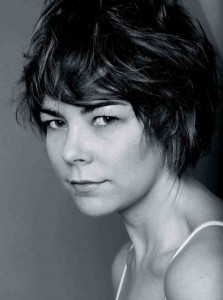
Hanna Pylväinen’s debut novel, We Sinners, follows the Rovaniemis, a family of nine struggling with the demands of a conservative Finnish church in modern Michigan. The book is a heartbreakingly honest examination of belief in all its manifestations, and reveals how the faith that binds a family together can also rend it terribly apart. In July, I spoke with Pylväinen over Skype about truth in fiction, writing about religion, and how a book can be like a galaxy.
Hanna Pylväinen is from suburban Detroit. She graduated from Mount Holyoke College and received her MFA from the University of Michigan, where she was also a postgraduate Zell Fellow. She is the recipient of residencies at The MacDowell Colony and Yaddo, and a fellowship at the Fine Arts Work Center in Provincetown, Massachussetts. We Sinners, her first novel, was just published by Henry Holt. Currently, she lives in Brooklyn, where she is completing her second novel, The End of Drum Time.
Jennifer Tomscha: Let’s talk about the obvious first. You were born into and raised in a Finnish religious community much like the Rovaniemis’. Can you speak a little about the pleasures and the difficulties of writing about a community so close to that of your own childhood?
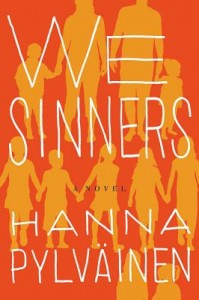 Hanna Pylväinen: Talking about my family is the obvious question and actually an important one… You asked about pleasures. I think the answer is that there is never any pleasure in writing [fiction] that others suspect to be true. In an ideal world, the work could function in a vacuum in which no one knew I came from this community or that fact that I did was unimportant, but I think the nature of human curiosity is such that everyone wants to know what’s true and how much is true. Picasso said, “Art is a lie which allows us to tell the truth.” And I think that’s really the most honest answer—that the book is all a lie. Every little bit of it is a lie, but it’s a lie that allows me to be more honest.
Hanna Pylväinen: Talking about my family is the obvious question and actually an important one… You asked about pleasures. I think the answer is that there is never any pleasure in writing [fiction] that others suspect to be true. In an ideal world, the work could function in a vacuum in which no one knew I came from this community or that fact that I did was unimportant, but I think the nature of human curiosity is such that everyone wants to know what’s true and how much is true. Picasso said, “Art is a lie which allows us to tell the truth.” And I think that’s really the most honest answer—that the book is all a lie. Every little bit of it is a lie, but it’s a lie that allows me to be more honest.
For my undergraduate thesis I wrote a memoir, and when I look back at the memoir now, I realize that my fiction is actually more honest. When I was less worried about getting things right and less worried about facts and less worried about capturing a particular person or a particular feeling, I became more interested in character and story, and the honesty itself improved. Because you know we always say that plot comes from character, and the more that I invested myself in these fictional characters and the more they surprised me, the more my characters and their plots began to step outside the things I knew and the people I knew. In a strange way, I think the heart of the writing became exponentially more honest.
In creating a portrait of this community, what liberties did you take? Or, perhaps more generally, what do you see as the obligations of the fiction writer to a community she is describing?
I took every liberty that could possibly be taken. I took them all. My work acknowledges the existence of a very particular small community that has not been written about, which is different, say, than being Catholic and writing about the Catholic Church. In that sense, as a writer who writes about the Catholic community, you’re not seen as having much ownership of the community. You’re seen as having a very small piece of the pie of Catholicism. But when you write about such a small community—and it doesn’t even have to be a religious one, it can be a family or people in the circus, any kind of subculture—whether or not you want to, you are invoking a representation. The only way that I could be comfortable with that was to ignore that obligation completely.
I think actually there’s some solace in putting the art first and putting the story first. I never wrote with the expectation that anyone would want to read the book, and I think that’s what saved the book from being an advertisement in one way or another, either for the community or against the community. I think if you write with the obligation in the background, aware of the eyes and ears of your parents, siblings, friends, neighbors, anything, from the get-go, you’re sacrificing your art on the altar of responsibility. Peter Ho Davies said this to me: “Fiction is deniability, and there’s freedom in that.” I deny it all being true, because it simply isn’t true.
Recently someone asked Carolyn Chute which of the characters in her novel, Merry Men, was most like her, and she said, very quickly, that she was every one of her characters. Would you say the same?
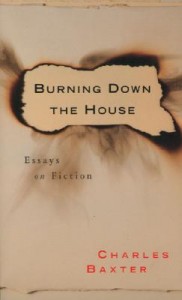 Absolutely. And I would say I am all of my characters’ faults. All of their flaws are my flaws. Flaws are what make characters interesting to us. Charlie Baxter argues in Burning Down the House that characters in contemporary fiction, in general, don’t make real mistakes anymore. That was an essay that affected my work profoundly, and one of the things I began to think about was the ways in which I misbehave as a person and the ways in which I have made a million and one mistakes. The ways any of my characters misbehave or behave badly are not always things I have done, but I always want to believe that their mistakes at a certain level make sense to me. Although I’m not sure I can claim the things that are really good about my characters or their moments of redemption; those come more from other people I’ve known.
Absolutely. And I would say I am all of my characters’ faults. All of their flaws are my flaws. Flaws are what make characters interesting to us. Charlie Baxter argues in Burning Down the House that characters in contemporary fiction, in general, don’t make real mistakes anymore. That was an essay that affected my work profoundly, and one of the things I began to think about was the ways in which I misbehave as a person and the ways in which I have made a million and one mistakes. The ways any of my characters misbehave or behave badly are not always things I have done, but I always want to believe that their mistakes at a certain level make sense to me. Although I’m not sure I can claim the things that are really good about my characters or their moments of redemption; those come more from other people I’ve known.
Did you discover anything unexpected in the process of completing your first book?
I learned that I’m more lonely than I think I am. [Laughs] If my characters share a desire, or if they share an inherent Achilles’ heel, it’s loneliness, and I think that speaks to the structure of the book. We readers have the advantage of seeing what all the characters think at once, but the Rovaniemis very rarely hear one another. We can see what a problem these silences are in the family, and yet they want to be able to express those things. And I think that, due to their personalities or the culture of the church, they can’t and they don’t. Can anyone in my book feel communal and happy? But I suppose happiness is not particularly interesting.
We live in a post-Goon Squad world. A novel’s structure feels limitless. We Sinners is a kind of close third-person kaleidoscope, shifting from family member to family member. I had the sense of the Rovaniemi universe expanding like the Big Bang, eventually moving beyond the family to other people and other places.
You spoke of structure adding dramatic irony. Can you talk more about this form—why it felt right for this book, and how it came to be?
Although I’m not sure I realized this outright at the time, I think to a certain extent the book’s structure mimics the act of growing up, both in a literal sense that the characters are younger and they grow older, but even more from a psychological standpoint. In the early chapters, the characters are closer together and feel more similarly about the church and about each other. The world in which they operate is very small; inside very compartmentalized spaces. They’re in the van, they’re in the church, they’re in the apartment. Then the van again, church, house. Slowly, the book begins to add other spaces—movie theaters, colleges, and then bars, other cities. There’s a way in which, absolutely, I saw the structure of my book as the spiraling arms of a galaxy. The stories start very close together and slowly expand outward. In part because that was my own psychological experience of growing up.
You end with a kind of origin story, the chapter “Whiskey Dragon.”
The questions that often I ask about being from this community, as well as what I ask in studying other communities, are: Where does any of this come from, or where do we come from? One of the things that interests me about all religions is where they begin and how they began. This is why I wanted to end with “Whiskey Dragon.” Because all of us—no matter how ordinary we think we are, and keeping in mind that the Rovaniemis see themselves to some extent as ordinary—have origins. This is true not just with religions, but also belief systems and political organizations. Laestadianism is a great case study, since it was founded (and you have to be careful about that word, “founded”) in 1850s Scandinavia, relatively recently, and it helps us to consider the question of how all religions have begun.
The other thing, which I was trying to do intentionally, is that the Rovaniemis don’t think about Laestadius. They don’t discuss their own culture. They really lack an ownership of their own past, and I think that’s why it’s essential that that story stand alone at the very end and answer a question that all of them ask without asking: Where do we come from, and why?
One of your characters thinks, “People always said that things were easier said than done, but that didn’t make sense if the saying was the doing.” The speaking of forgiveness is also the act of forgiveness. You beautifully capture this Protestant emphasis on the Word as supreme event, and the consequences of this belief. What are your thoughts about language and belief? What is power of fiction for you?
Writing has become my own form of confession and my own form of absolution.
I don’t mean confession in the sense of exposé or of dirty laundry or of revealing sordid truths. Especially in We Sinners, I’m not interested very much in why people choose to leave these communities. I’m much more interested in why people choose to stay. Religion used to be my way of centering and understanding my world, of making my decisions. Religion gave me the terms of my life, and, to some extent, now writing dictates those terms. I think of writing as a means for me to obsess with what I’ve always obsessed with, which is God. Emily Dickinson once said that her flood subject was Death, and I think my flood subject is God. It’s an obsession I never tire of.
We’re both from large families. You have seven siblings; I have four. Do you think there’s anything about being from a large family that has helped you as a writer?
Perhaps, because in a large family, and also in the type of religious community I grew up in, we were always taught not to put ourselves first. When I thought more abstractly about what my voice is as a writer, what I sounded like, I realized one of my interests was to not put myself first, if possible. To a certain extent, I aim for ego-less writing, in that I want the egos of my characters to take the forefront. That’s a stylistic decision, but I think to some extent it must come from my family and from a way of always interacting with others by worrying about them, and by seeing my own decisions always as having ramifications for others.
And of course, there’s just the obvious fact that I grew up with lots of personalities. One of the things you realize in really big families, which is both shocking and not shocking, is that everyone is their own person. And you may have come from the same family and slept in the same beds and eaten the same food and had the same piano lessons, but as much as you want to believe that you are the same, there’s a certain inherent falseness to that. We’re all utterly different.
Can you name some writers who write about religion in a way you admire?
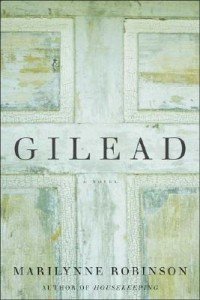 Yes, but not that many. The name that jumps to everyone’s mind is Marilynne Robinson. She does a wonderful job of creating religious people that are not pitiable or pitiful, which I think is a real danger. To that extent I also really love books about Christ. I loved [José] Saramago’s The Gospel According to Jesus Christ and I also loved Jim Crace’s Quarantine, which are both books that directly confront the question of Christ the person walking on the face of this earth. I think Flannery O’Connor absolutely did that and… I don’t know. The list isn’t long. Pearl Abraham, absolutely. Bernard Malamud. Chaim Potok.
Yes, but not that many. The name that jumps to everyone’s mind is Marilynne Robinson. She does a wonderful job of creating religious people that are not pitiable or pitiful, which I think is a real danger. To that extent I also really love books about Christ. I loved [José] Saramago’s The Gospel According to Jesus Christ and I also loved Jim Crace’s Quarantine, which are both books that directly confront the question of Christ the person walking on the face of this earth. I think Flannery O’Connor absolutely did that and… I don’t know. The list isn’t long. Pearl Abraham, absolutely. Bernard Malamud. Chaim Potok.
It’s so easy to be dismissive of religion.
Absolutely. Because it’s so much easier to be snarky about God than to be sincere. Sincerity is the hardest to capture of almost any emotion, and to have characters who sincerely believe in God, or to have moments of faith, moments of belief—this is trickier than writing about sex. It is trickier than writing about music. To me, sincerity is hard both because we’re in an ironic age, but also because it’s hard for sincerity not to feel cheesy and it’s hard to not make those characters seem silly. And yes, of course, the danger is how easy the snark is.
Can you talk about your new novel?
My new book is called The End of Drum Time, and it takes place in the world of “Whiskey Dragon.” None of the characters reappear, except for Laestadius and his wife. But it’s actually the story of one of Laestadius’s daughters who—surprise, surprise—runs away from the family. One of things that got me really interested in “Whiskey Dragon” was the world of the Samí people and their former shamanism, and how the shamanism was left behind for this brand of Christianity.
I’m very excited about [the novel], and that’s been a real gift, to be so involved in the new project. The only solace that I ever have in the drama of writing about a community that does not want me to write about them has been to return to the work. It’s delusional, it’s hubristic, it’s idiotic, but your work is the only answer, and so to have work to return to is my sanity.
Further Links and Resources
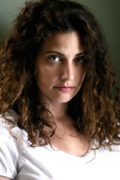 Jennifer Tomscha was born and raised on the Great Plains. She has a master of theology from Harvard Divinity School and an MFA from the University of Michigan, where she was a 2011 Zell Postgraduate Fellow in Creative Writing. Her work appears in the Fall 2012 issue of Glimmer Train. She is at work on a novel about love, among other things.
Jennifer Tomscha was born and raised on the Great Plains. She has a master of theology from Harvard Divinity School and an MFA from the University of Michigan, where she was a 2011 Zell Postgraduate Fellow in Creative Writing. Her work appears in the Fall 2012 issue of Glimmer Train. She is at work on a novel about love, among other things.





